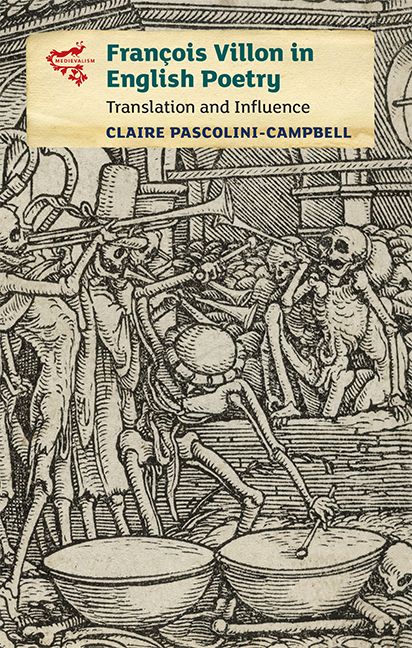Book contents
- Frontmatter
- Contents
- A Note on the Poets and the Poems
- Acknowledgements
- Introduction
- 1 Then and Now: The Legend of Villon in the Middle Ages and in Modernity
- 2 Villon and Swinburne: Finding and Singing Villon
- 3 Villon and Rossetti: Poetics of Strangeness
- 4 Villon and Pound: Modernity and the ‘Mediaeval Dream’
- 5 Villon and Bunting: Prison-Writing and Parody
- 6 Villon and Lowell: Imitation and the Visible Translator
- Conclusion
- Appendices
- Bibliography
- Index
- Medievalism
Introduction
Published online by Cambridge University Press: 09 October 2019
- Frontmatter
- Contents
- A Note on the Poets and the Poems
- Acknowledgements
- Introduction
- 1 Then and Now: The Legend of Villon in the Middle Ages and in Modernity
- 2 Villon and Swinburne: Finding and Singing Villon
- 3 Villon and Rossetti: Poetics of Strangeness
- 4 Villon and Pound: Modernity and the ‘Mediaeval Dream’
- 5 Villon and Bunting: Prison-Writing and Parody
- 6 Villon and Lowell: Imitation and the Visible Translator
- Conclusion
- Appendices
- Bibliography
- Index
- Medievalism
Summary
FRANÇOIS VILLON, FIFTEENTH-CENTURY versifier and alleged denizen of the Parisian criminal underworld, haunts English poetry like a restive spirit. Perhaps only Dante is comparable among other medieval European poets for the extent to which his oeuvre has navigated linguistic and temporal boundaries: like Dante, Villon becomes many different poets in his poetic afterlife through a process of transformation and absorption. First revived by the Pre-Raphaelite and Aesthetic poets in Victorian England, his appeal has extended to Modernists and Postmodernists in the British Isles and North America alike, and his influence reveals itself in the work of some of the most canonical writers of the nineteenth and twentieth centuries, such as Eliot, Yeats, and Faulkner. The activity of translation has been key to his posthumous survival and the number of English versions of Villon has continued to grow. However, despite the frequency with which his work has crossed linguistic barriers, there have been few sustained analyses of the resulting translations and adaptations, or, indeed, of the methods and motivations of the translators.
Instead, scholars have tended to approach the topic of Villon in English through the medium of reception studies, and readers wishing to know more about that interesting topic have many resources available to them. James K. Robinson, Glen Omans, and Michael Morsberger, for example, have each examined the surprisingly ubiquitous presence of Villon in Victorian literature and literary criticism. Similarly, in the introduction to François Villon in his Works: The Villain's Tale, Michael Freeman provides a detailed survey of Villon's reception on either side of the Channel, arguing that the medieval French poet has earned ‘a special place in English literary consciousness’. The series of conference proceedings edited by Jacques Dérens, Jeans Dufournet, Marcel Fauré, and Freeman have likewise been crucial in introducing Villon scholars to the concept of a global Villon, one whose presence extends far outside his own cultural and temporal specificity. In addition, Robert D. Peckham, has both written on Villon's reception in North America and produced extensive print and digital bibliographies, which remain invaluable resources for any scholar studying the presence of Villon in contemporary canons.
- Type
- Chapter
- Information
- François Villon in English PoetryTranslation and Influence, pp. 1 - 15Publisher: Boydell & BrewerPrint publication year: 2018

